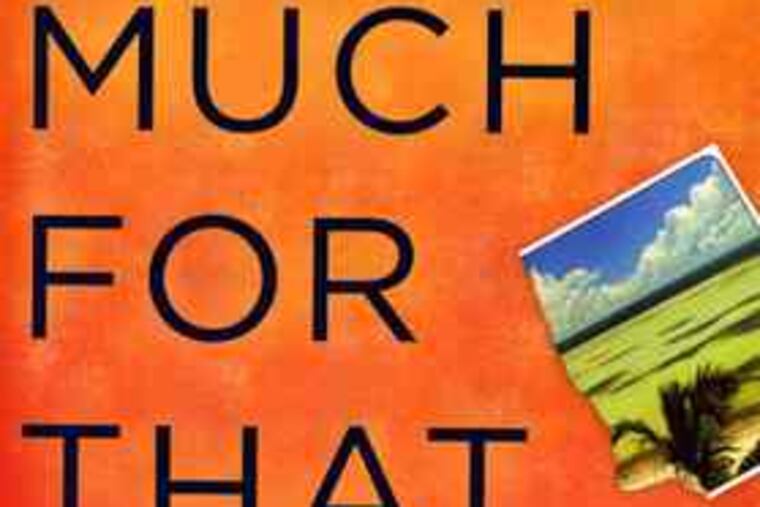Facing devastating illnesses
It's possible Harper either sped up or delayed the publication of Lionel Shriver's new novel to coincide with this crucial month in the drive to revamp health care. If they did, they needn't have.

nolead begins By Lionel Shriver
Harper 433 pp $25.99
nolead ends nolead begins
Reviewed by Abby Frucht
It's possible Harper either sped up or delayed the publication of Lionel Shriver's new novel to coincide with this crucial month in the drive to revamp health care. If they did, they needn't have.
Give or take a few congressional recesses, So Much for That, which follows the travails of characters through three devastating illnesses and their medical, personal, social and financial consequences, would still be as timely as We Need to Talk About Kevin, Shriver's prizewinning best seller, which took its cues from Columbine. The question is whether So Much for That is not only timely but timeless, like the story of the parallel universe Shriver wrote about in The Post-Birthday World.
So Much for That opens with a description of a fountain eccentrically constructed by the book's resourceful hero, Shepherd Armstrong Knacker. Made of whirling, tipping parts, the fountain reminds Shep of the Mouse Trap games he once played with his whiny sister, Beryl. His sister regards her brother's fountains - as well as his job at a handyman business, his law-abiding nature, and his 24/7 promise to "fail valiantly" in his doomed efforts to save his dying wife, Glynis - as indulgent sellouts compared to Beryl's cottage industry of making navel-gazing documentaries funded by small grants and large "loans" from Shep. Those loans will stop coming.
Glynis, a metallurgist, has been diagnosed with mesothelioma, and it's evident from the book's unsparing depiction of this much-litigated illness that Shriver researched it as prodigiously as she researched the rare (thank goodness) familial dysautonomia suffered by the Knacker friends' teenage daughter, Flicka.
Plagued by rashes, seizures, acid reflux, chronic drool and scoliosis, the tube-fed, wheelchair-bound Flicka endures her terminal illness by being "a caustic brat." As vile as the illnesses of Flicka and Glynis may be, if the book has a villain, it's a toss-up between the doctors who milk Shep's every last nickel only to inflict unjustifiable hope on the cadaverous Glynis, and the World Wellness Group, "the health insurance company from hell."
Shep's employer at Handy Randy, a "callow, loudmouthed, ignorant twit," reminds readers that the well-being of employees should never be left to their bosses. Meanwhile, Shep's fountains trickle ever more weakly, in tandem with his dream of The Afterlife, as he calls his lifelong plan to escape with his loved ones to the clove-scented island of Pemba off the East Coast of Africa, donate his skills as a well-digger, and "eat the best pineapples you've ever tasted."
The dream's fulfillment, which Shep has put off for years to save money for it, is dealt another blow by the internment of Shep's father at the costly Twilight Glens nursing home.
Shriver infuses her novels with the commentary of a seasoned journalist. A writer for the Guardian and the Economist, her ease in personalizing important global issues keeps readers entertained.
Her modus operandi is sly. By making her characters as irreverent, smart and, let's face it, as naughty as she is, Shriver is able to put her words in their mouths and not appear to be calling Terri Schiavo in her vegetative state "a fat, vapid, floppy imbecile" or feeling schadenfreude at the sight of New Orleans's dispossessed residents clinging to their roofs during Hurricane Katrina.
In Shriver's hands, the U.S. government is "a for-profit corporation . . . that could charge whatever it wanted . . . with no obligation to hand over a product of any description in return." And a deliciously amusing riff on the degradation of the American infrastructure closes with, "You only cared about any of this stuff if you also cared that someday San Francisco could slide into the Pacific . . . or that your country might soon be owned entirely by China."
That Shriver's characters often serve as mouthpieces for her own nasty take on things can be forgiven, especially because by the end of their timely, timeless stories, they're as real as the guy munching potato chips on the couch.
I closed this book in awe of Shep's goodness and generosity, at peace with the peace Flicka finally achieves, tearful for Glynis, and still hoping for Beryl to be mistakenly awarded a million dollars for best documentary featuring her hangnail.